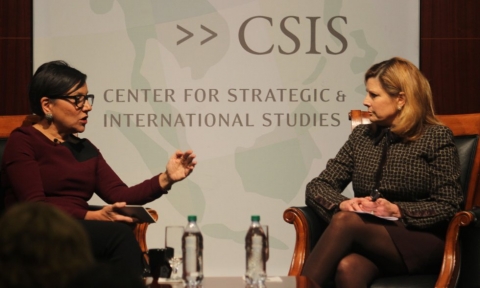Jan032017
Posted at 11:28 AM
Last month, U.S. Secretary of Commerce Penny Pritzker participated in the Center for Strategic and International Studies (CSIS) Smart Women, Smart Power (SWSP) interview series. In her conversation with CSIS fellow and Fortune Washington columnist and senior editor-at-large Nina Easton, Secretary Pritzker reflected on the Commerce Department’s accomplishments during the Obama Administration, and what the incoming Administration can do to keep America “open for business.” Their conversation can be found here, on CSIS’ website.
During the interview, Secretary Pritzker highlighted three key areas in which the Department of Commerce has advanced, and will continue to advance, growth and prosperity in the dynamic 21st century economy.
1. Trade
International trade strengthens America’s economy, global leadership, and national security. Continuing to open markets to American goods and services abroad is critical to U.S. competitiveness. Secretary Pritzker stressed that while trade remains a complicated topic for many citizens, the U.S. cannot pull up its drawbridges and retreat into isolation. Instead, we must continue explaining the benefits of trade to all Americans, while helping those that have experienced disruption due to the effects of globalization, automation, and trade, become equipped for the jobs of the 21st century. Here’s what Commerce has done to keep America open for business through trade:
- Negotiated the Trans-Pacific Partnership (TPP), the most high-standard trade which levels the playing field and opens new opportunities for U.S. workers and businesses.
- Through TPP, renegotiated NAFTA to bolster bilateral trade relations with Mexico and Canada.
- Strongly encouraged China to treat U.S. businesses fairly by cutting overcapacity in markets such as steel and semiconductors.
- Worked with countries such as Ukraine to pursue pro-business, pro-democracy reforms in a geo-strategically critical region.
2. Manufacturing and Skills for Business
The nature of jobs and work is changing. Alternative work arrangements – including contract work, freelancing and so-called “gig economy” work – are on the rise. Driven by new technologies, these changes are creating economic opportunities in many sectors, but are likely to involve economic disruptions as well. At the same time, American manufacturing is making a come-back, but the manufacturing jobs of tomorrow require highly-skilled workers who are as comfortable programming machines as they are operating them. Through the Skills for Business agenda, the Commerce Department is working to provide American workers with the skills they need to compete. Under Secretary Pritzker’s leadership, Commerce has:
- Worked with the White House to release a workforce development plan to expand the number of pathways for Americans to gain the skills they need to access better, higher-paying jobs.
- Championed Manufacturing Day, an annual event for manufacturers to highlight their work and their workers and to energize a future pipeline of skilled workers.
- Expanded the National Institute for Standards and Technology’s (NIST) Hollings Manufacturing Extension Partnership (MEP) Centers to help build the workforce development ecosystem for manufacturing.
- Collaborated with nonprofit partners such as the Aspen Institute to help communities develop comprehensive strategies to create a pipeline of skilled workers to fill local jobs.
3. Leading the Way in the Digital Economy
Digital technologies have quickly become a driving force of entrepreneurship and innovation in the 21st century. They have changed the way people live, work, and communicate; and how businesses access markets, manage supply-chains, and enable transactions. To ensure government and the private sector work together to capitalize on these opportunities and meet these challenges head-on, the Department of Commerce has:
- Established the Digital Economy Board of Advisors (DEBA), comprised of technology industry leaders, innovators, and experts, which recently released its recommendations.
- Expanded the Digital Attaché program to help American exporters compete in the digital global economy.
- Created the Commission on Enhancing National Cybersecurity’s (Commission) to help strengthen cybersecurity in the public and private sectors. Read their Report on Securing and Growing the Digital Economy here.
- Prioritized cybersecurity education and workforce development through NIST’s National Initiative for Cybersecurity Education (NICE).

